So, you’ve successfully launched your start-up business. You’ve hired a few employees and it’s time to consider moving into a full-time office space. This can be a daunting prospect, but it’s also an exciting one ripe with potential.
The importance of a suitable work environment cannot be overstated. There’s a long list of things to consider when on the hunt for the ideal office, particularly when you need the flexibility that life as a start-up requires.
In this guide, you’ll find tips and some things to bear in mind when searching for your business’s first office space, along with pointers on making the right decision for you and your team.
Why the Right Office Space Matters
Aside from the practical benefits of working in a space that has the necessary amenities, there are also benefits to productivity for you and your team to consider. Company culture is important, and the right location can play a substantial role in establishing this culture.
Your start-up’s first office space is important for the following reasons:
- It will set the mood for your employees – so an attractive office with contemporary facilities is a no-brainer
- A healthy work environment has a positive impact on productivity
- An office in a strong location sends the right message to stakeholders and potential employees
- The right office will act as a springboard as your business continues to grow
A reliable office provides some semblance of stability to your daily workflow. Even when your work inevitably throws up hurdles to overcome, it’s important that your office isn’t one of them!
Your Office’s Location is Vital
Establishing your team in an appropriate location is one of your chief priorities when office hunting. Making your base in the right location will set the tone for your team, your partners and your clients.
Choose an office in an area that will serve you well with the people close to your business, with good access and close proximity to fundamental services like restaurants and transport hubs. Also consider things like the availability of natural light in the office, as natural light can improve workplace productivity as well.

Determine What Facilities You Need in Your Office
Getting together a list of desired amenities for your start-up’s office space is another crucial consideration to make before you begin your search. This will vary from universal considerations – like meeting rooms and recreational space – to facilities that are more ‘nice-to-haves’ or specific to your field, like breakout spaces, standing desks and office equipment exclusive to your industry.
Some common ones to think about are:
- Meeting rooms
- Breakout rooms for employees
- Office layout
- Kitchen equipment and space
- Leisure space
- General office equipment you want for all your employees
- Parking
It’s important to balance the essential facilities you offer with additional bonuses that contribute to your workplace culture and employee wellbeing. Flexible working is becoming increasingly desirable for employees and employers in the UK, so providing a means of facilitating this for employees where possible will go a long way.
How Much Office Space Do We Need?
Space is another key consideration. Of course, the size of your desired office will depend on the number of team members you have, and whether you’re planning to continue growing in the near future.
As a rule of thumb, we’d recommend a minimum of 40 sq. ft. per employee for everyone on your team to remain comfortable. You’ll also want to consider things like meeting room space, which won’t require as much permanent space per employee, but still enough to accommodate your whole team comfortably.
Private office floors to rent may be an appealing option, but a co-working office space is viable as well, especially for smaller start-ups that need an adaptable arrangement that can change on a monthly basis.
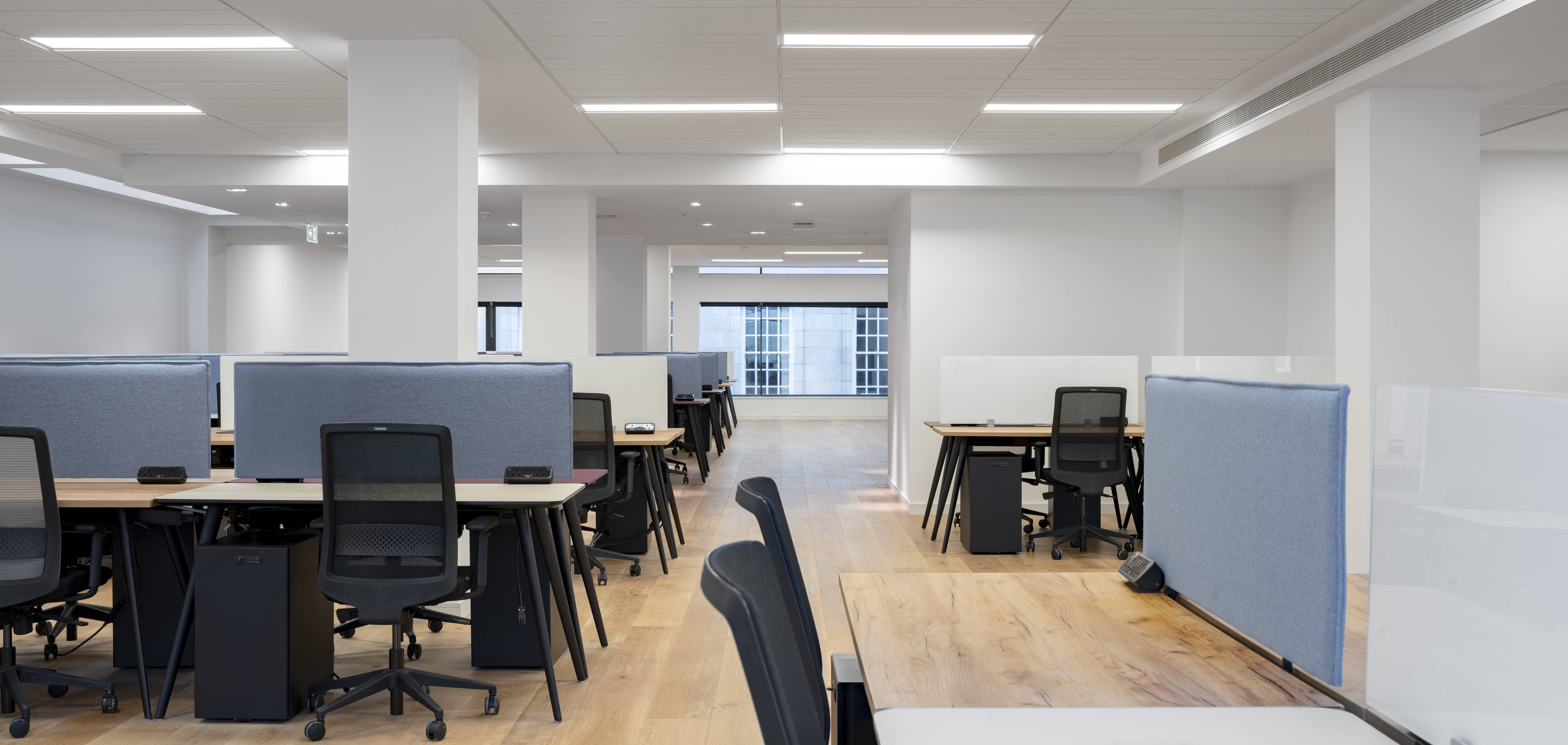
Understand Your Budget and Costs
For start-ups, defining your office budget is very important, particularly seeing as your income may vary from month to month.
As such, a serviced office space can be a real winner, offering a single-package deal that covers every cost of using the space. Serviced office spaces typically offer this arrangement, which is part of what makes them so popular with start-ups (alongside the opportunity for networking with other businesses in the building).
At Us & Co, we offer rolling monthly flexible office memberships on co-working spaces – the perfect solution for start-ups who require a greater sense of flexibility. With this membership, space can be increased or decreased as needed, giving you an office that moulds to your needs even as your business evolves.
Consider Utilising a Co-Working Space for Unrivalled Convenience
The benefits that come with a co-working space – alongside the convenient membership package you’ll find with such an arrangement – make it well-worth investigating for start-ups who need office space that grows alongside your business and team.
Start-up life is constantly in flux, so you may find yourself in need of an adaptable work environment that gives you room to grow and takes the hassle out of running an office. If you’re based in London or Dublin, our serviced spaces could be the perfect solution for you.
A co-working space also typically comes fully furnished. All you’ll need is the personal essentials your workforce uses day-to-day – just turn up, plugin and you’re ready to go.
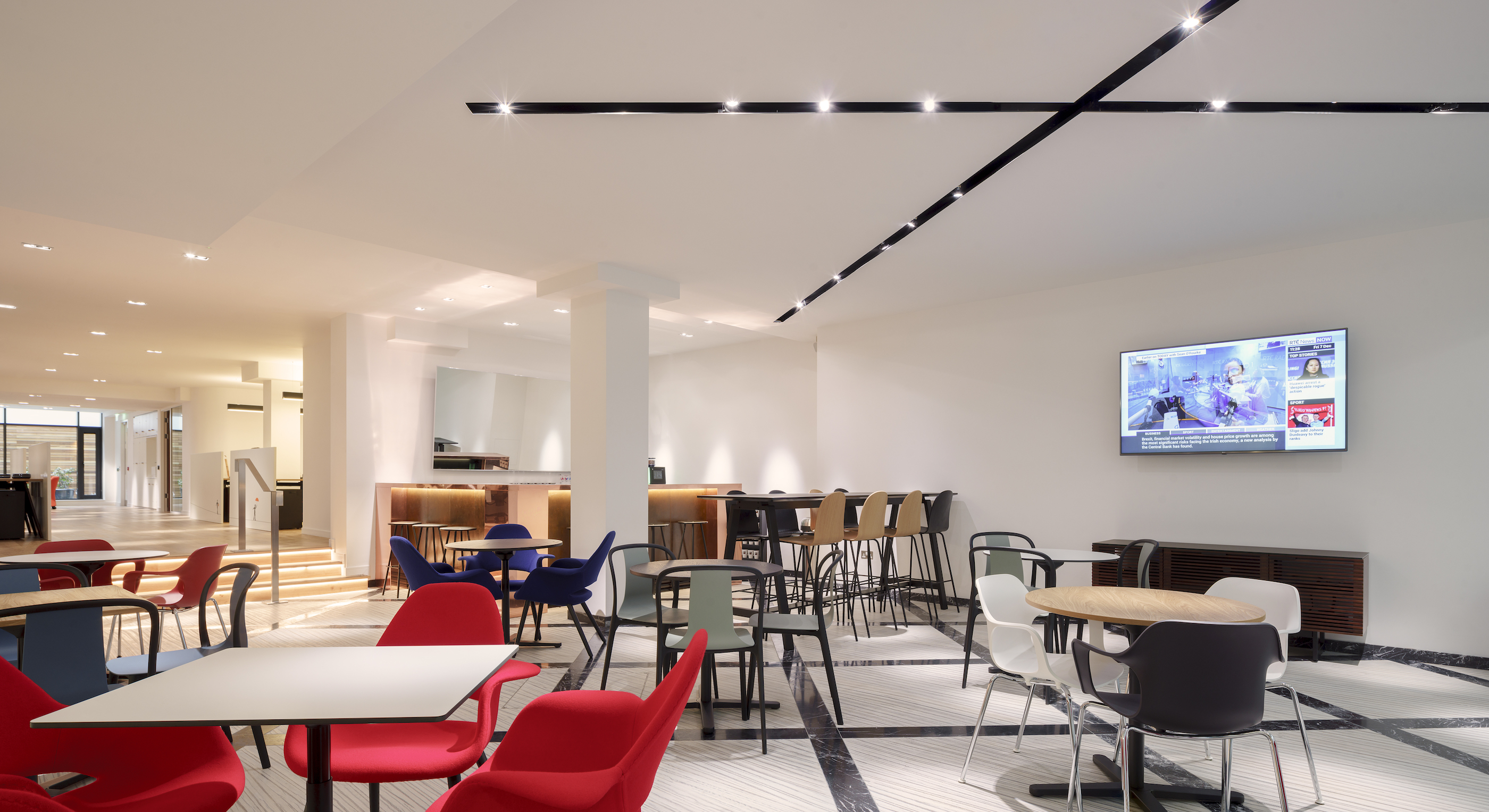
Enquire About a Coworking Office Space for Your Start-Up Business
If a co-working arrangement sounds like your ideal start-up office space, get in touch with us today to find out about membership with Us & Co and to book a tour of our office spaces.
With co-working facilities in London and Dublin, we’re fully equipped to facilitate start-up businesses from a range of industries in the UK and Ireland.
Whether you’re a team of 4 or 100+, our range of options has something for you. Browse a virtual tour of each of our 3 locations below and give us a call if you’d like to find out more.
London, Stratford – Us & Co Virtual Tour
London, Monument – Us & Co Virtual Tour
Dublin, St Stephen’s Green – Us & Co Virtual Tour
8 Facilities to Look for When Hiring a Meeting RoomSuccessful meetings are built on first impressions. The meeting room facilities at your disposal can make or break your event, so choosing a venue that offers the necessary amenities is essential.
A meeting room is so much more than just four walls: it’s a world of opportunity for every attendee when utilised efficiently.
Taking it a step further with state-of-the-art meeting room facilities that don’t break the bank is the true first prize. To that end, we’ve prepared this list of features to look out for when hiring a meeting room.
If you’re looking for the highest-quality event possible, be sure to tick each of these things off your checklist:
1. Adaptable Meeting Spaces
If you want an adaptable meeting space, look out for facilities that can fit groups of various sizes. Whether you’re after a meeting room for 1-to-1 scenarios like interviews, for presentations to sizeable groups or roundtable board meetings, choose a space that can flex to your needs. Visit it beforehand, if possible, to ensure you’re happy.
Stand-up meetings are becoming increasingly popular in the corporate workplace. Find out more about the advantages of stand-up meetings here!
In the current social climate, you should also consider a venue with a COVID-secure workspace policy – this is essential, not only for health and safety but also for the peace of mind of your attendees.
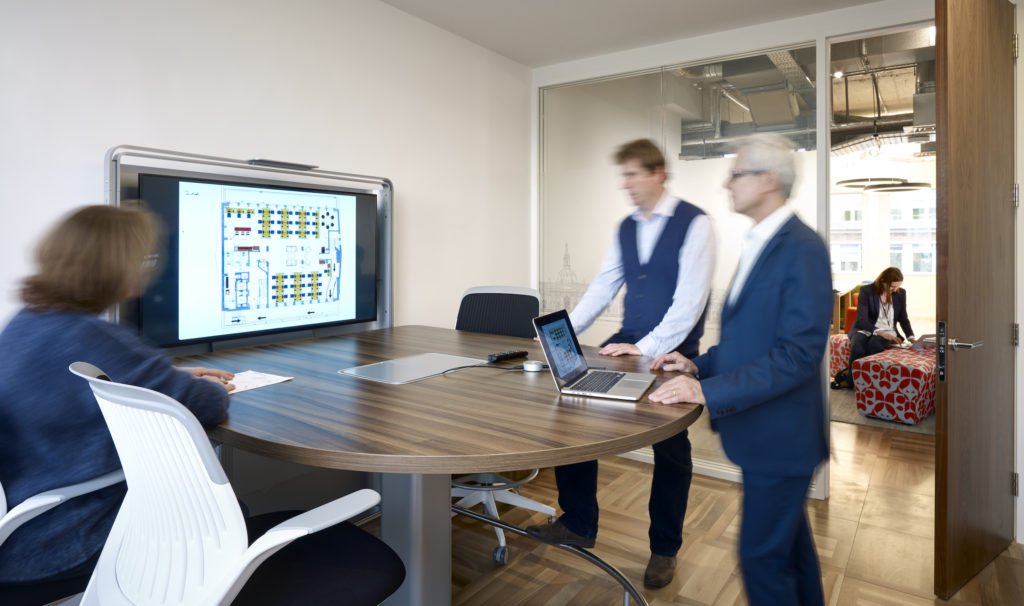
2. Comfortable Seating
For any meeting, sometimes it’s the little things that get in the way of your attendees’ enjoyment and engagement. Uncomfortable seating is one of those things, so ensure your venue has seating with lasting comfort no matter how long the event is due to run!
Whichever meeting room arrangement you’re going for, comfortable seating is a necessity; it allows your attendees to focus on the important things without undue distractions.
Read our blog for more tips for surviving a long meeting.
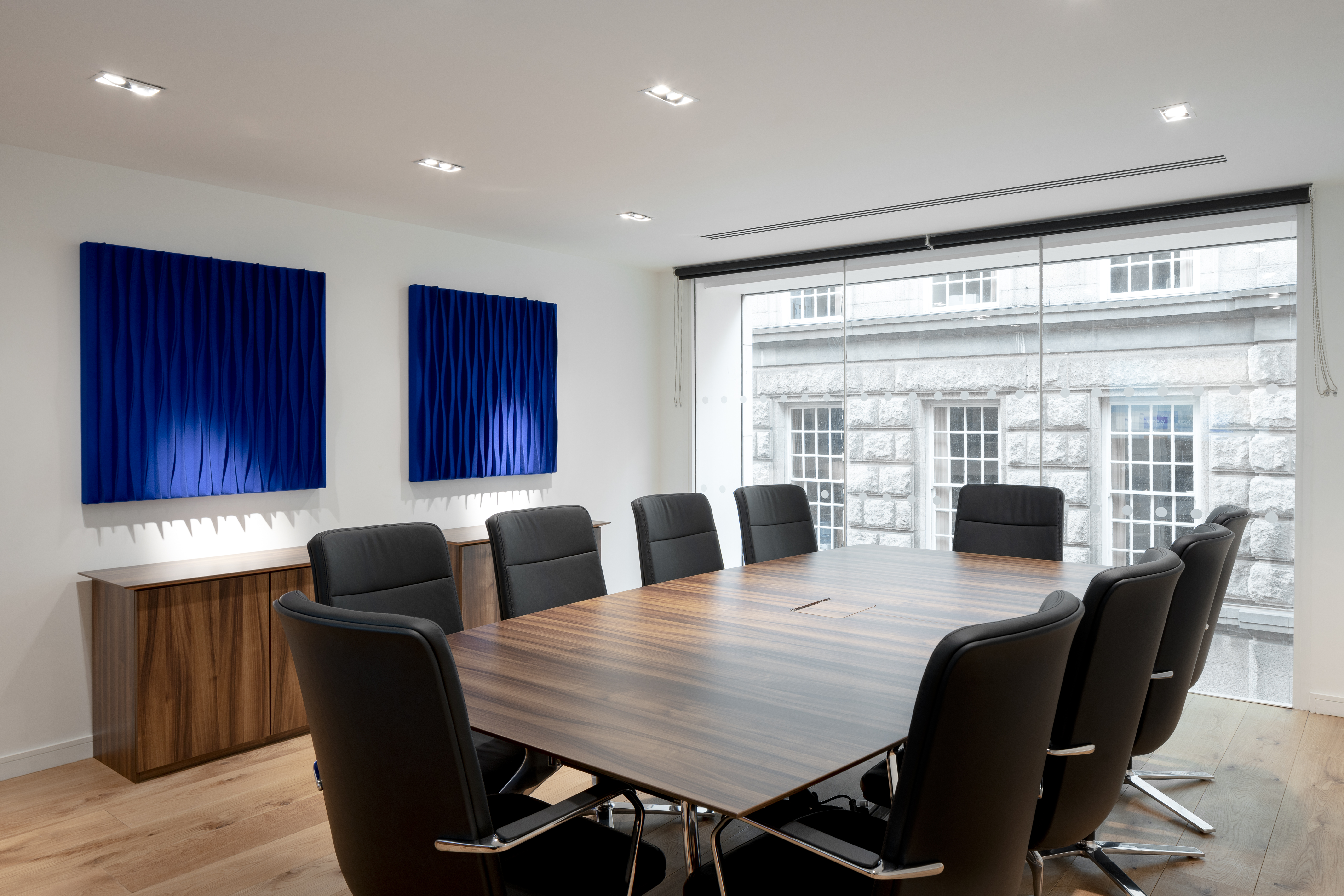
3. An Inspiring, Accessible Location
An attractive and accessible location will make it easier for attendees to find the venue and mitigate any hassle before your event has even begun. More importantly, ensure the venue is accessible for those with disabilities. If you are unsure about this, speak to the management team.
The trophy pick is a venue in a central hub. Chances are your attendees will be familiar with the area and so can find it more easily.
Us&Co has meeting facilities in Central and East London and the heart of Dublin.
A location surrounded by attractive amenities, such as restaurants and other areas of interest, will likewise make a good impression, so bear this in mind.
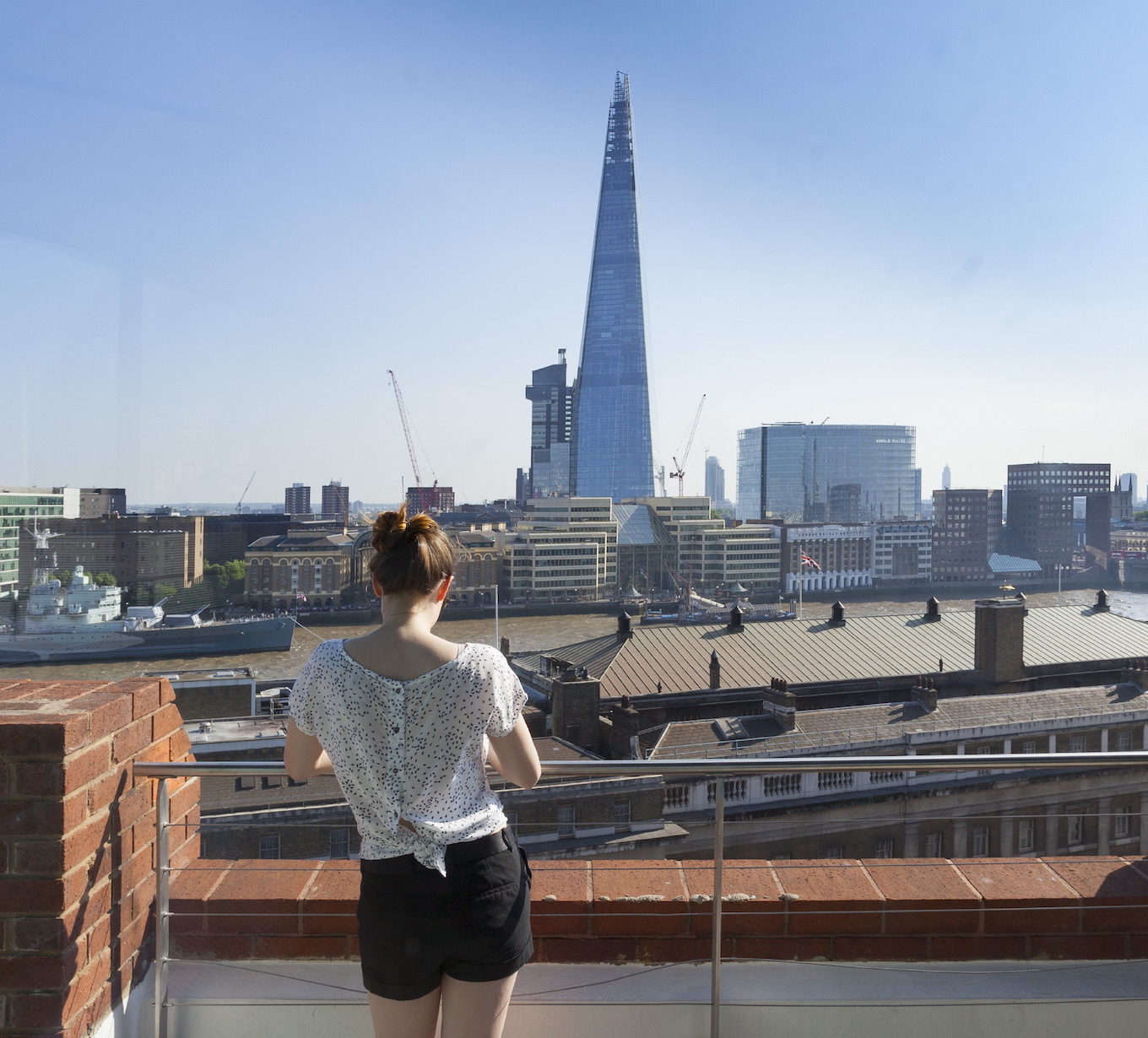
4. Breakout Spaces for Networking Opportunities
There’s no substitute for face-to-face meetings. If the past two years have taught us anything, it’s that we thrive on in-person interaction Choosing a space that facilitates this will elevate your meeting to no end, giving your group valuable networking opportunities as well.
An impactful event relies on more than just what goes on in the meeting room itself. Utilizing a meeting room facility that offers breakout spaces like an open-plan kitchen/lunch area will serve your attendees well as a decent networking space during breaks and between sessions.

5. Fully Stocked Technology Suite
This is non-negotiable in the modern meeting room. Reliable technology that both engages users and maintains reliability throughout your meeting’s runtime is vital for getting the most out of the event – and keeping your attendees invested.
Be sure to tick these things off your technology checklist in any prospective meeting venue:
- Reliable, superfast Wi-Fi connectivity
- Hassle-free presentation software
- Integrated room speakers
- Video conference facilities for virtual attendees
- The necessary connectivity facilities, e.g. cables, ports, etc.
- An on-hand in-house technician to help you get set up
Inefficient technology facilities can stop your meeting in its tracks, so to avoid any frustration, ensure you’re happy that the included facilities are up to modern standards!
6. Catering Options at the Venue
If you’re hosting an all-day or even half-day meeting, having catering options at the venue is a vital convenience. An in-house catering team offers a reliable alternative to sourcing food yourself on the day – simply let them know in advance what you want and at what time during the day. Thereafter you can put it out of your mind, allowing you to focus on other logistic considerations!
This works in tandem with giving attendees networking opportunities – food is a fantastic social catalyst after all, so ask the venue for a list of catering options and pick out the most appropriate options.

7. Adequate Parking Space
Ample parking becomes increasingly important the more attendees you have, so you’ll want to be sure there’s plenty of space for all your attendees beforehand.
Of course, a central and accessible location may mitigate the need for parking somewhat, especially in larger commercial hubs, but this is still a point worth considering and a potential contributor to attendee satisfaction.
8. A Reliable Venue Management Team
Finally, be sure to choose meeting facilities managed by a reliable, responsive, and adaptable team. All a venue’s other facilities can be substantially elevated when handled by a management team that ensures your experience is as hassle-free as possible.
Be sure to discuss your requirements with the venue’s management when enquiring about their meeting rooms to ensure all your needs are catered.

Explore Us & Co’s Meeting Room Facilities in London and Dublin
Us & Co is a series of flexible co-working office spaces in London and Dublin. We’re passionate about helping young and growing businesses find the perfect solution to their office space needs – and we offer a variety of meeting room facilities for rent at all of our locations.
If you’d like to find out more, get in touch with us – our team can talk you through your options for meeting room rental at our 3 locations:
Everything You Need to Know About Hiring a Day OfficeContemporary work life is in a state of flux. Thoughtful workspace allocation has become the norm, with modern businesses increasingly looking towards a flexible use of office space to accommodate their employees.
Day offices are an enticing option that businesses have become increasingly drawn to, across the UK. Their flexibility and ease of use have made them a popular option for businesses looking for an office space that moulds to their needs.
What is a Day Office?
Day offices are a flexible and reliable solution for businesses who need a temporary workspace for a day, or a set number of days each month. These office spaces are private and fully equipped to allow a business to simply show up, plugin and start working.
Renting office space for 1 day can typically be done on a flexible plan. You choose the day or days you want to rent the office space, and it’s then yours for that period of time. Find out more by viewing Us & Co’s day offices.
The difference between a day office and hotdesking
This may sound similar to hotdesking, but there are some key differences.
While both hotdesking and day office rental is a flexible workspace solution, hotdesking is a little more unpredictable in that your exact workstation can change depending on who else is using the space.
With day offices, the entire space becomes your private office for the day, meaning you can use it consistently without any disruption for as long as you’re renting it.
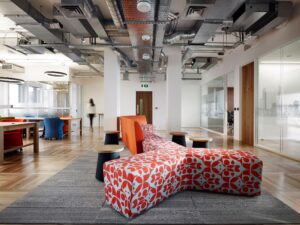
How a Day Office Can Enhance Your Business
If you’re a business owner looking for a workspace for your employees, day offices offer a secure, adaptable space that can flex to and around your schedule. The benefits of flexible working are a win-win for employers and employees!
These spaces include workstations built-in for however many employees you need space for, freeing you up from worrying about office furniture.
Many day offices also have convenient amenities built-in, such as kitchen spaces, breakout areas and even some catering options. They’re the perfect companion to a hybrid work style if you’re looking to balance days working from home and getting your team together in a more corporate setting when desired.
Cultivate a professional image without the stress of maintaining an office
Because day offices are fully set up ahead of each visit, they’re the perfect way of enjoying an office environment minus the commitment that comes with handling it all yourself. You’re free to show up, get your work done, and leave – while maintaining an air of professionalism that comes with having your own space.
An office space that flexes around your requirements
Many day offices are not just flexible schedule-wise but are also flexible with the amount of space you can hire. They can cater to businesses of all sizes, whether you need space for 6 or 100 employees. This means your plan can also scale alongside your business if necessary, giving you space to grow without the hassle of finding a new office.
With more and more companies embracing the decision to work from home, a day office complements the modern working life if you still want to keep an office setting for a few days here and there.
Read our blog on the benefits of renting a desk for the day to find out more about how a day office can enhance your working day.
The Employee Benefits of Hiring an Office Space for 1 Day
Day offices aren’t just great from an employer’s perspective; they can also offer a great work environment for employees to enjoy as well.
Collaborative work environment
The biggest thing that working from home is missing for many businesses is a sense of collaboration between team members. If your team benefits from days in the office together, a flexible office environment can be the perfect means of doing so when needed.
Whether you need a space intermittently or as part of a rolling monthly plan, a day office is a fantastic way of injecting some cooperation and productivity into tasks where needed.
A change of scenery for home-workers
If your team is used to regularly working from home, a day office can offer just the change of scenery they need to enhance productivity. There are more pros of working from the office than simply a fresh environment, but the importance of a break from working from home can’t be overstated!
Unique networking opportunities with other tenants
Coworking spaces present an indispensable opportunity for networking. With a range of other businesses under one roof, it’s the perfect environment for sharing ideas and engaging with other professionals on a daily basis.
Outside of your own office space, communal areas are a great space to meet like-minded people and share ideas.
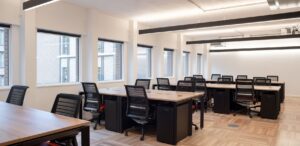
What to Look for in a Day Office Space
If you’re in the market for a day office, there are important considerations to look for when choosing the right space:
- A flexible rental plan that works for your business and workforce
- Attractive premises that show your business in its best light
- Access to breakout spaces and meeting rooms
- Fast, reliable wi-fi
- Regular cleaning services between sessions and robust COVID-19 safety measures
- Location convenience – close to transport hubs and other important amenities
Day offices are designed to give you all the comfort of a top-tier office environment in the most convenient possible package, so choose a space that best fits this brief.
Find the Perfect Office Space for a Day with Us & Co
If you’re looking for a flexible office solution in London or Dublin, Us & Co’s day offices may be perfect for you. Contact us today to find out more about our gorgeous spaces and to book a viewing.
You can also see virtual tours of our locations below:
London, Stratford – Us & Co Virtual Tour
London, Monument – Us & Co Virtual Tour
Dublin, St Stephen’s Green – Us & Co Virtual Tour
3 top interview techniques to help you get that job
The pandemic has cast a cloud of uncertainty over many aspects of our lives. The rulebook has been thrown out the window; our home is now our office, the UEFA Euros 2020 is being played in 2021, and job interviews are now all predominantly online. Things we take for granted, such as the Olympics being held every 4 years, can be thrown to the wind as a luxury of a bygone era.
Nevertheless, things are not all doom and gloom. Even though there has been a marked increase in unemployment due to the pandemic, according to the Financial Times, “the UK Labour Market has begun to thaw” as recruiters see one of the strongest rebounds in permanent hiring in years. Ireland, cautiously optimistic, show signs of the following suit.
But what does this mean for job applicants? What new tricks do we have to learn to ace that job interview?
Thankfully, not much has changed on that front. Besides dialling into a video call from the comfort of your own home, you can rest assured that if you get the basics right, you have already built a solid foundation for any interview!
But don’t take our word for it! We talked to Fiona Joyce, the Office Support Principal Consultant for Sigmar Recruitment, the largest organically grown recruitment consultancy in Ireland, who provided us with 3 of her top tips for an interview. This is what she had to say…
1: Do Your Research
Heading into any interview, you should be fully aware of the role and what the organisation does. My best advice here would be that you should study the job specification well enough that you should be able to explain what the position is without needing to refer to the job spec.
When researching the organisation, you must study their website and search for any articles or announcements about them. A good rule of thumb is that you should talk for 90 seconds about the company. This doesn’t mean talking about the company’s entire history, but you do want to be able to demonstrate that you know who they are (key players), what they do (a brief overview), and their overall ethos and culture.
With this company research – drop it in where you can. Show off your homework! Passion and Enthusiasm for the company and role can be a deciding factor between two people. Remember, they are hiring a colleague as well as an employee!
Tip 2: Know Your CV
It sounds like a no-brainer, but it’s still a piece that trips a lot of people up!
When speaking about your CV, you should know your dates, past employment, and role duties so well that if all copies of your CV disappeared tomorrow, you could re-write it from scratch.
Many employers will ask you to take them through your CV. The best way to run through your CV is to go through these 3 easy steps:
1. Where you worked and when.
2. Your job title and a brief overview of your core duties – give 3 – 5 points on what you did there and skills you learned in the process.
3. Why you left this job – again, a brief line to explain why you left.
Follow this structure as you talk through all of your roles, and you should be able to get through your CV run-through quickly and concisely. The interviewer will then ask for more information on areas of specific interest, and this is when you should go into more detail.
It’s imperative that if it’s on the CV, you need to be able to talk about it! I’ve often interviewed people who have experience on their CV from ten or more years ago, and when asked about it, I’ve been told, “I can’t fully remember; it’s so long ago!”. This will damage your chances in an interview. The experience that the employer is asking about may be of particular importance or relevance to the position that you have applied to, which is why they will want to know more about it. You have one chance to grab this job, so don’t waste it by not putting in the work on (re)learning the CV.
With video interviews being the norm these days, it is easier for you to have your notes nearby but out of sight. However, it’s important not to spend too much time looking at them during your interview. I’ve interviewed candidates over video daily for the last year, and I quickly noticed that you could very easily tell when someone was reading their CV off the screen versus reciting it from memory. An interviewer will want to see that you are present, engaging, and aware of your experience. Avoid reading your CV, as it will pull attention away from you when you break eye contact with the interviewer.
Tip 3: Be Passionate and Honest
When asked why you have applied to this role, be honest. Every hiring manager out there has heard the words, “I’m looking for a new challenge”! Give them a reason that’s personal, original, and specific.
Many people feel the need to sugar-coat their reason for leaving, but it’s perfectly acceptable to tell the truth, and say, “I’ve learned all I can in my current role”, or “It’s no longer an industry that I’m passionate about”. This does not reflect badly on anyone; it’s just a genuine reason for wanting a change.
This may link back to Tip 1., but while you’re looking into the organisation, you should identify things about the organisation that appeals to you, the reasons why they appeal to you, and why you genuinely want to work with them. Don’t be afraid to tell your interviewer, and don’t be shy in using emotive language such as “I love the fact that…” or “What really attracted me to…” or even “What I found to be very impressive is…”.
When giving examples, give them from the point of view of already being in the role, doing the job. This lets the interviewer see that you are already thinking from the perspective of their new employee. For example, you could ask a question like, “When I am running this report, where is the data coming from?”. It’s a question that shows your understanding of the role and engagement in the interview process and allows the interviewer to hear that you’re already envisioning yourself on their team!
Get in touch with Us&Co today:
Stratford, East London Flexible Workspace, 11 Burford Road, E15
Phone us: 020 3102 4010
Please email us: enquiries@usandco.com.
London, Monument Flexible Workspace, 7 Harp Lane, EC3R 6DP
Phone us:020 3102 4010
Please email us: enquiries@usandco.com.
Dublin St. Stephen’s Green Flexible Workspace, 5 School House Lane East
Phone us: +353 (1) 529 4100
Please email us: enquiriesdublin@usandco.com

As we draw closer to the finish line of this pandemic, flexible working hangs in the balance. Now that we have seen that flexible working is manageable but successful for so many, we should see an uptick in companies offering flexible working. However, according to the Chartered Institute of Personnel and Development (CIPD), two-thirds of employers are not willing to introduce new types of flexible working; “research… showed that only three in 10 employers (30 per cent) are looking to introduce new types of flexible working (excluding working from home) over the next year“. Though this statistic may appear to signal the end of flexible working, the opposite is true. It’s undeniable that the way we work has changed forever. The truth is the benefits of flexible working are a win-win for employers and employees alike. Flexible working is here, and it’s here to stay.
But what is “Flexible Working”?
Flexible working describes a working arrangement that provides flexibility to how long, where, when and/or what time you work, away from your existing working arrangement such as the traditional 9 to 5. Flexible working comes in many different shapes and sizes, from Remote working to Job Sharing and is very much adaptable to the individual.
But what benefits can flexible working provide employers and employees? Let’s find out.
Interested in having a flexible workforce? Why not have a flexible workspace too! Get in touch with the Us&Co team to discuss a flexible office membership at our London Monument, London Stratford or Dublin workspaces.
Flexible working benefits for businesses
Though companies may be reluctant to implement flexible working in the long-term due to a hesitancy to restructure their operational model, they need to consider future-proofing their business. You can develop a myriad of reasons not to push the boat out, but you’ll soon find yourself in shallow waters. The way we work has changed, and it has changed for the better. The benefits of flexible working for employers will outweigh any negatives that may appear to rise to the surface. For instance, by adopting it now, you can adapt much faster than others to the nuances involved and reap these subsequent benefits.
Reduced Costs
By implementing flexible working, you can review your costs and realise you can make significant savings by downsizing your real estate footprint. This will not only reduce rent but also reduce your IT requirement, furniture expenditure and utilities. You can also reduce costs by using a flexible service provider who offers short-term flexible leases, which avoids the need for CapEx.
Less Presenteeism & Absenteeism
According to the Centre of Mental Health 2017 report, presenteeism (reduced productivity at work due to being ill) cost the UK £21.2 billion per annum. By offering flexible working options, you could reduce your individual costs and better your employee’s mental health. The same is true for absenteeism as the report found that absences due to sickness cost the UK £10.6 billion each year while a further £3.1 billion was spent on staff turnover due to poor mental health alone. Flexible working, be it hybrid working, part-time or job sharing, can greatly benefit your employee’s mental health, which will benefit productivity and costs.
Productivity
Flexibility breeds creativity and, in doing so, inspires productivity in employees. Over the last year, employers have found that flexible working (working from home) didn’t cause a drop in productivity, and indeed some found an increase in productivity. According to a survey carried out by the CIPD, 71% of employers found that working from home has either boosted or made no difference to productivity.
Staff Retention & Morale
By providing flexible working options to your staff, you will gain company loyalty through your employees, who will be less likely to move jobs. Employees have many various personal responsibilities, and being allowed the flexibility of work to maintain a good work/life balance will create good morale and attract new talent. Therefore, employers who offer flexible working arrangements have a substantial advantage in the recruiting process and have access to a larger talent pool.
Flexible working benefits for Employees
As we now know, employers can benefit greatly from flexible working, but what really are the benefits of flexible working for employees? The reality is that employees have been calling for flexible working arrangements since the invention of the personal computer. And now over a year into the pandemic, we can see what benefits employees can reap from flexible working, which is evident from a study done by academics at Cardiff University and the University of Southampton who found that nearly 90% of all those who have worked more flexibly during the pandemic wish to do so once it is over.
Better Work/Life Balance
Flexible working provides staff with the time and space to adapt to their own personal lives, such as parental and familial responsibilities. According to CIPD, 20% of working people are stressed due to family relationships, while over half of those who flexibly work felt it is a good way to achieve a good work/life balance. Allowing employees this much-needed flexibility can help reduce their stress levels, resulting in a more productive and happier workforce.
Higher Job Satisfaction
Giving employees the autonomy to manage their own working hours and schedule can have tremendous benefits on their job satisfaction. People work better when they can choose when and where they work. It improves their focus and productivity. Flexible working also can inspire the entrepreneurial spirit in employees, which can be very beneficial for their confidence and overall job satisfaction. The autonomy of flexible working can also decrease employee burnout as they will be comfortable taking time-out to recoup.
Reduced Expenditure
It might seem like a small and obvious benefit, but the lack of commute not only does wonders for your mental health but also saves you money. According to a survey carried out by PR Agency Tyto, the average London commuter spends £5,114 per year. This does not include the intangible mental cost of unpaid hours travelling in and out of work. By flexibly working, be it hybrid or working remotely full time, you will reduce the cost of your commute considerably. When you consider not having to buy lunches or pay for childcare, the savings increase exponentially.
Of course, there can be some disadvantages to flexible working. Some, while flexibly working, experience a stigma called flexism – where staff are discriminated against due to flexibly performing their roles. Nevertheless, any drawback like this one is more indicative of organisational problems than flexible working itself. Flexible working is very much on the rise if not becoming the norm. The true benefits of which have not yet been truly realised.
Get in touch with Us&Co today:
Stratford, East London Flexible Workspace, 11 Burford Road, E15
Phone us: 020 3102 4010
Please email us: enquiries@usandco.com.
London, Monument Flexible Workspace, 7 Harp Lane, EC3R 6DP
Phone us:020 3102 4010
Please email us: enquiries@usandco.com.
Dublin St. Stephen’s Green Flexible Workspace, 5 School House Lane East
Phone us: +353 (1) 529 4100
Please email us: enquiriesdublin@usandco.com
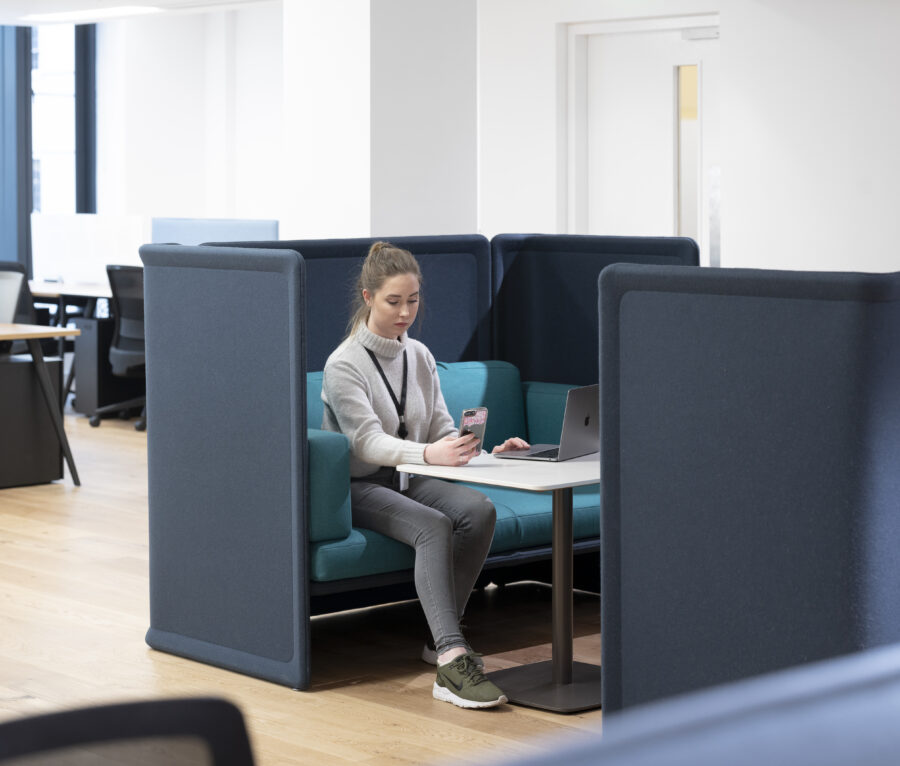
For many years, remote workers were looked upon in envy by their traditional office worker counterparts. Shunned for their flexibility and avoidance of the classical working day. Now, in 2021 many of us have experienced what life is like working remotely, though more accurately, we found out what life is like to work from home. Although there are a number of benefits from working from home (WFH), the separation between work and personal life has become increasingly blurred. However, the negatives of working from home cannot be equated to remote working. We need to move beyond the notion that remote work equals “working from home,” the options for how to spend your day are pretty endless.
Coworking day passes revolutionised how the remote working community operate. Remote workers no longer have to resign themselves to finding a “quiet” corner in a café with poor to average internet speed. All they need to do is go online and find the nearest coworking company and book a day pass. For instance, at Us&Co, a day pass gives full access during opening hours to the coworking area, providing a desk, high-speed internet, access to phone booths, and self-service tea stations with bean-to-cup coffee, all for a nominal fee.
Interested in trying out coworking day pass yourself? Get in touch with the Us&Co team to discuss a day pass or membership at our London Monument, London Stratford or Dublin workspaces.
Why use a day pass?
It comes as no surprise that we might be feeling the negative effects of WFH for over a year. Coworking day passes are the solution! Shrug off that feeling of lethargy and start trialling coworking spaces around your area. A great benefit of renting a desk for the day is that it’s like shoe shopping; you try one on until you find one that fits, there’s no commitment. Especially with the reopening of many cafés, you might feel a bit reticent about overcrowding. Us&Co prides itself on being fully COVID-secure, operating social distancing throughout their centres.
How do day passes work?
Day passes couldn’t be simpler! All you need to do is go online to your desired coworking space’s website, book the day you wish to work, and then on the day, announce yourself at reception, and you’re set for the day! Alternatively, call up the coworking space, and their friendly staff will guide you through the booking process over the phone. The only difference between a monthly member and a day pass is that the member has full 24-hour access to the building. Allowing them to come and go as they please. Day passers are limited to the opening hours of the co-working centre.
Who would benefit from using a day pass?
In truth, anyone would benefit from using a day pass. If you are in need of a desk for the day, in a productive work environment among like-minded individuals, then a day pass is for you. Specifically, day passes tend to be used by remote workers and freelancers, though by no means limited to those two groups. Entrepreneurs and small start-ups also avail of coworking day passes, as the small price and non-committal nature of the day pass allow you to carry out your own market research. If you travel a lot for work, coworking spaces can become a second office for some, allowing you to have an office away from the office.
Productivity
If needs be, cafés can be used in-a-pinch, but they’re not the best places to encourage productivity. Coworking spaces strive to provide a work environment that not only facilitates creativity but enhances productivity. Day passes allow you to “plug in” to the productive atmosphere fostered by coworking spaces. Working from your kitchen table for a year not only puts a strain on your back but also on your productivity. Our homes were never intended to be used as offices. You may be surprised to hear, but poor lighting, air quality and lack of temperature control will have a negative impact on your productivity. Us&Co centres were purpose-built for productivity in mind, with lots of natural light, intuitive temperature and airflow regulation.
Cost-Effective
Time is money! You can’t spend half the day searching for that “free” elusive corner that ticks all the “conducive workspace” boxes. Paying a small fee that provides all your requirements for the day is a no-brainer. Coworking day passes exist to make your life easier.
Networking & Collaboration
Working from home for the past year has really highlighted our need for face-to-face interaction. Coworking spaces are a great place to casually network with people in other industries facilitating new organic working relationships. Day passes are a great way to meet like-minded people due to the very nature of coworking spaces. Meeting new people every day tends to incite new streams of thought, opening up new perspectives and ideas, which in turn motivates productivity.
Interested in a day pass or more?
Experience Us&Co’s professional coworking spaces with a day pass. Why not try our other flexible memberships such as Hot and Fixed desks or rent out meeting rooms in London and Dublin. We pride ourselves on creating a working atmosphere in which budding businesses, SMEs and individuals can thrive and grow.
Our Locations:
– London Stratford co-working space, 11 Burford Road
Phone us: 020 3102 4010 | Email us: enquiries@usandco.com
– London Monument co-working space, 7 Harp Lane
Phone us:020 3102 4010 | Email us: enquiries@usandco.com
– Dublin St. Stephen’s Green co-working space, 5 School House Lane East
Phone us: +353 (1) 529 410 | Email us: enquiriesdublin@usandco.com
5 Reasons Why COVID-secure Workspaces Are Essential

The simple truth is that the continuing pandemic has altered the way we work for the foreseeable future. Many businesses, taken unawares by the pandemic back in March 2020, were required to have their staff work from home (‘WFH’). A year on, businesses have now permanently implemented a WFH option, seeing it as an opportunity to review rental costs by downsizing and offering more flexible terms to their employees. Nevertheless, even though vaccines are beginning to be rolled out, we are all, in one way or another, contending with the very real effects of the “Silent Pandemic” of professional and social isolation.
Fortunately, when the first lockdown lifted, many serviced office providers implemented measures to make their workspaces COVID secure, thereby offering their members a reprieve from working from home. Us&Co, for instance, have created COVID-secure workspaces without sacrificing their ethos of fostering an environment of privacy while providing a space for natural collaboration.
This article will endeavour to highlight the main reasons why COVID-secure workspaces are essential for the future of work while dispelling any anxieties you might have about returning to the office
1. Hassle-free Luxury
Even though it falls to everyone to maintain COVID security, businesses are generally left carrying the brunt of the responsibility to provide a safe space for their employees. COVID-secure workspaces like Us&Co take that burden away by enhancing their cleaning regime, increasing airflow, and installing hand-sanitiser stations in strategic and convenient locations throughout their centres. Signage is also displayed to direct traffic flow, and furniture has been removed to allow for social distancing. Us&Co also goes one step further by commissioning anti-bacterial fogging (through the use of a similar product employed by the NHS) of all common and breakout areas to ensure its members are safe from the virus when working from their centres.
2.Professional and Social Isolation
Since the increase of remote working, there have been concerns regarding the loneliness that inevitably comes with being separated from your team-mates. These anxieties, however, are now heightened due to the pandemic. Professional isolation is not just a feeling of loneliness; it is a three-headed beast. When WFH, you tend to lose out on key “resources” such as IT or HR help; “opportunities” as you tend to be out of mind when you are out of sight; and arguably most importantly, “development” as you are stuck in your echo chamber, unstimulated by the success of others. Team-engagement relates positively to performance. COVID-secure workspaces like Us&Co nurture informal conversations and shared experiences which, in turn, facilitates team-engagement and decreases feelings of professional and social isolation.
3.Productivity
WFH not only makes our work more challenging by the very fact that our home environments are not conducive to team-engagement but also impacts negatively on our productivity. Needless to say, our homes were not designed for 9-5 office work. Poor lighting, air quality, temperature, and furniture all negatively affect productivity. Workspaces such as Us&Co are designed to enhance and inspire productivity with lots of natural light, intuitive temperature and airflow regulation and comfortable ergonomic chairs.
4.Private meetings rooms
Many co-working brands offer private bookable meeting rooms specially designed to facilitate team engagement. Us&Co have introduced a ½ capacity rule to ensure you can reconnect and work face-to-face with your team while also ensuring COVID safety. Each room is sanitised before and after every use to prevent any transmission. The rooms are also installed with sound-proofing panels to stop your conversation from being overheard. Click here to view our meeting rooms
5.Seamless Connectivity
Co-working spaces have made it a priority to provide their members with a secure, fast internet connection. For instance, Us&Co members have access to super-fast and highly secure Wi-Fi, the cost of which is fully included in the up-front membership fees meaning that members can host HQ video calls with confidence.
Looking for your next flexible workspace?
Us&Co offers professional co-working (hot desks, fixed desks, private offices, meeting rooms and event venue hire) in London Monument, Stratford East London and Dublin, St Stephens Green. We pride ourselves on creating a working atmosphere in which growing businesses, SMEs and individuals can thrive and grow. Get in touch with the Us&Co team today:
London Monument | Co-Working and Offices Space, 7 Harp Lane EC3R 6DP
Phone us: 0203 102 4010
Dublin St. Stephen’s Green | Co-Working and Offices Space 5 School House Lane East
Phone us: +353 (1) 529 4100
Stratford East London | Co-Working and Offices Space 11 Burford Road E15 2ST
Phone us:0203 102 4010
Meet the team, Interview with Andreea, Community Manager Viridis Monument

How and when did you discover coworking?
Probably in 2012, walked past a coworking space in Holland Park.
What has been your involvement in Us&Co?
I am the Community Manager for our Monument centre
When did you become the Monument Centre Manager?
In February 2019
How would you describe the community?
A great mix of people who work hard but also love a good event in our amazing Club Space.
Do you host any members events to bring the community together?
We usually find every reason to celebrate from Beer Thursdays to monthly cocktail events and all the usual holidays and then some.
What are the enjoyable aspects of working for Us&Co?
The Team, everyone is so supportive and passionate and easy to work with. And the buildings, everything is so beautifully made and having your lunch on the 9th floor with breath-taking views of the Thames, what more could one wish for!
What are the key aspects of managing a coworking space?
The most important thing is to ensure that my clients are happy and that the building is very well looked after and ready for them to enjoy.
What has it been like to manage a centre during COVID-19?
Different but we have adapted very quickly thanks to all the technology. The support we offer our clients has not changed, we are always available to respond to their requirements and, we are continually making sure we are always there to support them.
Andreea is the Community Manager at Us&Co Monument, 7 Harp Lane, London EC3R 6DP
Why use the tube when you can cycle to work!?

Why use the tube when you can cycle to work!?
Over the past few years, we have seen an exponential increase in the number of commuters cycling to work. Since restrictions were put in place on public transport at the start of the pandemic, there has been a significant rise in cyclists across the capital.
Many commuters were apprehensive and intimidated about the dangers of cycling on busy multi-lane highways. However, life for a cyclist is now a calmer one with new and improved cycle-lanes. Cycle-superhighways and quiet-ways have connected all four corners of London, making it easier and vastly safer to navigate through London’s busy city centre.
TFL are continuing to create safe routes for pedestrians and cyclists alike in their most recent Streetspace scheme. This new scheme endeavours to help manage the pandemic by creating more cycle lanes and broader pavements so that commuters can maintain social distancing. For instance, in the City of London around many of our centres, roads from Holborn to Aldgate are seeing significant cycling improvements. Our centres are now easily accessible by bike because of these new developments with several quiet-ways and cycle superhighways situated right on our centre’s doorsteps.
You might be thinking, “This is all well and good, but what if I don’t own a bike?” The answer is a simple one; hire a bike using the Bike Sharing Scheme! There are two different versions of bike hire across London, the docking station and the dockless bike scheme.
Here are a few examples:
Santander Cycles are the original, official London bike hire scheme operated by TFL. This scheme has been operational since 2010 and offers over 11,500 bikes with over 750 docking stations across London with several docking stations in walking distance of our centres. Hiring a Santander Cycle costs only £2 for unlimited journeys for up 30 minutes. All you need to do is either download the app or go to a docking station terminal with your bank card, and off you go when you finish your journey, alight from the bike and dock it into the nearest docking station at your destination.
Mobike arrived in the London Market in 2017 and operates under a station-free system. To use Mobike’s service, download the app, find the nearest bike to you, scan the QR code, and you’re away. The app runs on a top-up system, and ‘pay-as-you-go’ rides calculated depending on the amount of time you ride. The simplicity of dockless bike hires is that you can lock your bike anywhere. Just slide the lock across the bike and wait for the app to acknowledge that you have ended your trip.
Jump, formerly part of Uber, now recently acquired by Lime is back on the streets of London. An electrically assisted bike known as pedelecs; these bikes will take most of the burden off your legs. For now, Jump still has the ease of use of being a part of Uber’s app. As most Londoners will already have the Uber app downloaded, all you need to do is switch from ‘Trip’ to ‘Bike’ to find the nearest available bike. Again, to unlock the bike, scan the QR code. Jump also has the feature of reserving a bike for 30 minutes, which no other bike hire app offers. However, Jump is one of the pricier options with a cost of £1 to unlock and 15p for every minute thereafter.
The bike-sharing scheme is excellent for those who live in the City or commute by train into a mainline station. It can be a cost-effective way of getting around while keeping physically and mentally healthy. Not only does cycling have significant benefits to our mental health, but it is also a great way to avoid transmitting COVID-19 on public transport as you will now no longer have to be wary of overcrowding on tubes.
Get in touch with Us&Co today:
London Stratford Flexible Workspace, 11 Burford Road
Phone us: 020 3102 4010
Please email us: enquiries@usandco.com.
London Monument Flexible Workspace, 7 Harp Lane
Phone us:020 3102 4010
Please email us: enquiries@usandco.com.
Dublin St. Stephen’s Green Flexible Workspace, 5 School House Lane East
Phone us: +353 (1) 529 4100
Please email us: enquiriesdublin@usandco.com
Flexible Office Memberships
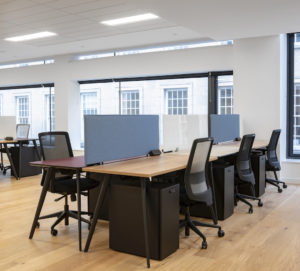
Us&Co are now offering Flexible Office Memberships– flexible solutions adapted to the new ways of working. If you and your team will only be using the office for a set number of days why pay for a full-time office agreement? With our Flexible Office Membership, you only pay for the days you use.
The same goes for the size of the office- if your staff will attend the office and work from home on alternate days, downsize to a smaller private office suitable for your needs but still retain the same number of team members who have access to the office.
While home working is not a new trend, there has been an exponential increase in 2020, due to the global pandemic. The past several months have compelled businesses to evaluate their office costs with many contemplating the necessity of having an office space at all. Though we will see large and small companies, decentralising their base of operations and incorporating remote working into company practices, the majority of businesses will need to maintain some form of centralised office space. According to a survey carried out by Hubble HQ of 1,000 employees from various companies, 70% said they had a positive experience working from home, but 71% of those surveyed believed their company should retain an office space of some sort.
Nevertheless, with restrictions still in place for the medium term and with greater percentages of team members working from home, the way offices are used will change. Companies which are splitting their teams and placing them on rotation throughout the week may be left with an office space unnecessarily large and costly for their needs. Serviced office providers like Us&Co are creating solutions for companies in these situations. Working in the office on alternate days, you can take a five person office and Us&Co will issue you ten access passes or one hundred passes if you take a large fifty-person office. Us&Co’s Flexible Office Membership can help businesses cut rental costs in half and still allow them to have an office presence.
Us&Co prides itself on tailored solutions. The flexibility of this membership can be adapted to the specific needs of each company. For instance, if you need an office one day a week, you only pay for that day. If you require three days per week or even a week per month, Us&Co can adjust the plan to suit your requirements. With Us&Co’s Flexible Office Membership, you no longer have to worry about the cost of an unused office, you pay for the space you use on the days that you need it.
Us&Co provides an all-inclusive solution without a long-term commitment – a membership can be just three months. You avoid the need for capex and the hassle of setting up and managing an office: ordering office furniture, organising a cleaning service, sourcing and paying suppliers, managing the Wi-Fi and providing refreshments for employees – it’s all done for you. The offices have been fully equipped to be Covid19-secure and members benefit from spacious break-out spaces and meeting rooms which are available for hire as needed. Us&Co allows companies to try out their new ways of working without potentially abortive expenditure and commitment.
Get in touch with Us&Co today:
London Stratford co-working space, 11 Burford Road
Phone us: 020 3102 4010
Email us: enquiries@usandco.com
London Monument co-working space, 7 Harp Lane
Phone us:020 3102 4010
Email us: enquiries@usandco.com
Dublin St. Stephen’s Green co-working space, 5 School House Lane East
Phone us: +353 (1) 529 4100
Email us: enquiriesdublin@usandco.co